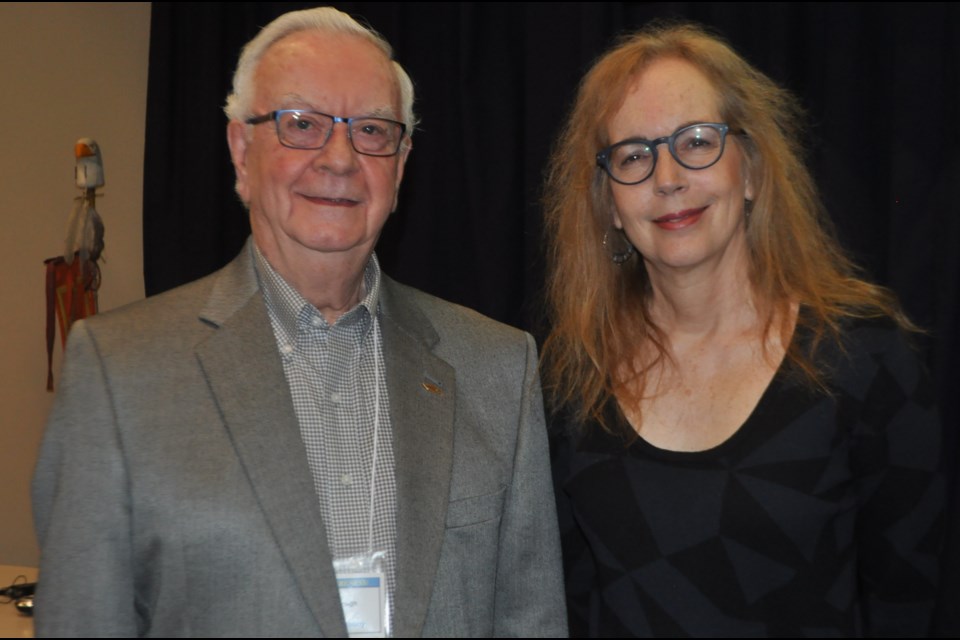While the warning signs for emotionally distressed seniors contemplating suicide are often there, many don’t know how to identify or handle them.
But that’s something Paula Frappier hopes to change.
During the 26th annual Suicide Awareness Conference Simcoe Muskoka Wednesday at Geneva Park near Orillia, the Guelph-based occupational therapist outlined some of the signs and potential causes that might cause an older person to take his or her life.
“Fifty per cent of attempts by seniors result in death compared to 13 per cent for the younger population,” said Frappier, the geropsychiatry community education coordinator at Guelph’s Homewood Health Centre and the Canadian Mental Health Association Waterloo Wellington.
Frappier said there are a bevy of risk factors that can lead a senior to suicide, ranging from the loss of a spouse, loss of independence and lack of social supports to transitioning to a new environment, loss of self-esteem and the loss of a family pet.
“If you take the cat out of the picture, what’s the reason that person has to swing their legs over the bed and get up in the morning?” she said, noting a suicidal senior might be complaining more about health issues and isolation while also exhibiting changes to sleep and appetite patterns and appearing more indifferent with greater dependence on alcohol or drugs.
“Things to watch for also include risky or impulsive behaviour and prolonged grief,” she said, noting that by 2035 it’s estimated that there will be 10.4 million Canadians over the age of 65, a figure that represents 22.5% of the population.
“Lots of depressed people don’t know they’re depressed. They might seem more ornery or edgy."
According to Stats Can 2017 figures, there were 3,890 suicides in Canada in 2009, a rate of 11.5 per 100,000 people.
The federal body's reported suicide rate for males was three times higher than the rate for females (17.9 versus 5.3 per 100,000). And while suicide deaths affect almost all age groups, those aged 40 to 59 had the highest rates with married people having a lower suicide rate than those who were single, divorced or widowed.
But while not all warning signs are obvious, Frappier said in some cases the calls for help (or “invites” as she calls them) might be simpler to identify.
“They might say ‘I can’t take it anymore, death isn’t a bad thing, I’m lonely, no one else is left,’” she said. “When you hear the invites, don’t dismiss them.”
Frappier said the suicide risk can be alleviated by ensuring seniors maintain a sense of hope and optimism while enjoying active social networks and interesting activities.
“We want to make it safe for people to share and seek help,” she said, noting it’s important to effectively listen and not judge another person’s feelings. “Don’t debate their thoughts and feelings but ask how it affects them and ‘how bad does it get?’”
John McCullough, a former board chair at Waypoint Centre for Mental Health Care in Penetanguishene, has suffered two major losses over the past six months with the recent death of his wife Phyllis and the passing of their 11-year-old Golden Retriever last fall.
“I relate to a lot of things being talked about,” McCullough said, noting he’s been very fortunate to have an excellent support network as he’s dealt with his grief. “I feel like I’m well on the way to recovery.”
Prior to Frappier’s talk, those attending the conference watched a play entitled AfterWhys that addressed the often-taboo subject and was written by playwright Catherine Frid, who noted the roughly one-hour-long drama often touches people because it’s based on real stories.
“We have found it plays very differently with different audiences,” Frid said, noting the play opens the conversation while opening one’s mind to how to best help family and friends who may be struggling and/or at-risk of suicide.
“When we play in seniors’ residences, they often say ‘it resonates with me because my neighbour who was in his seventies died by suicide.’”



